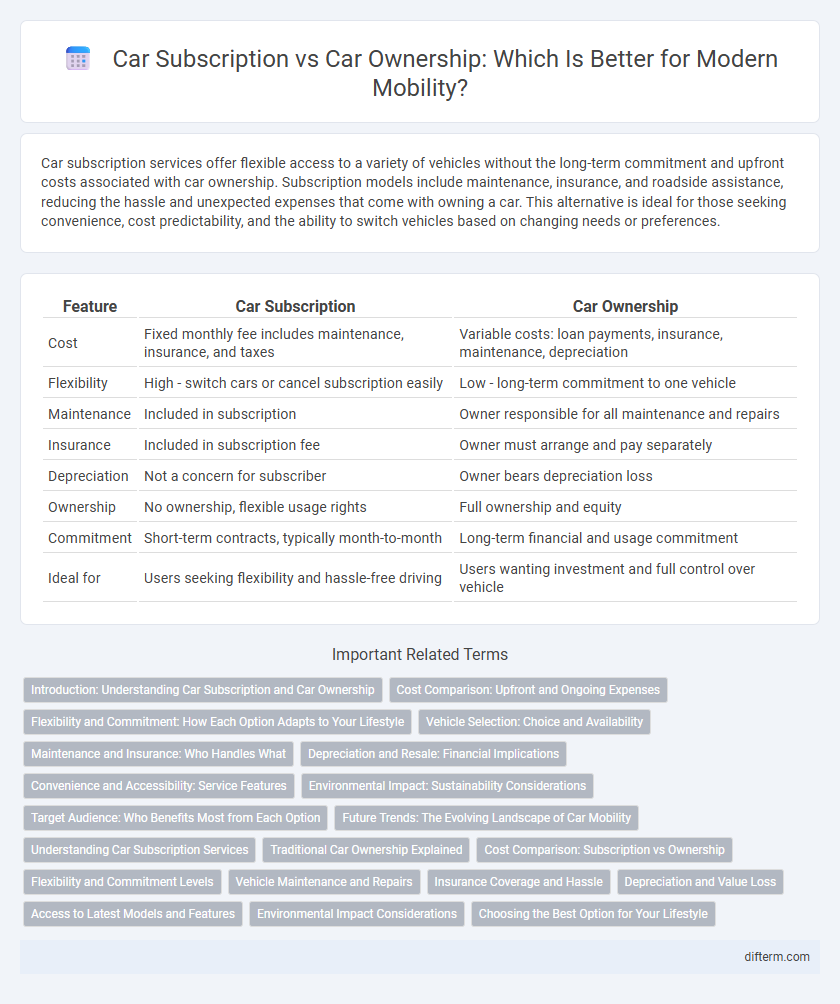Car subscription services offer flexible access to a variety of vehicles without the long-term commitment and upfront costs associated with car ownership. Subscription models include maintenance, insurance, and roadside assistance, reducing the hassle and unexpected expenses that come with owning a car. This alternative is ideal for those seeking convenience, cost predictability, and the ability to switch vehicles based on changing needs or preferences.
Table of Comparison
| Feature | Car Subscription | Car Ownership |
|---|---|---|
| Cost | Fixed monthly fee includes maintenance, insurance, and taxes | Variable costs: loan payments, insurance, maintenance, depreciation |
| Flexibility | High - switch cars or cancel subscription easily | Low - long-term commitment to one vehicle |
| Maintenance | Included in subscription | Owner responsible for all maintenance and repairs |
| Insurance | Included in subscription fee | Owner must arrange and pay separately |
| Depreciation | Not a concern for subscriber | Owner bears depreciation loss |
| Ownership | No ownership, flexible usage rights | Full ownership and equity |
| Commitment | Short-term contracts, typically month-to-month | Long-term financial and usage commitment |
| Ideal for | Users seeking flexibility and hassle-free driving | Users wanting investment and full control over vehicle |
Introduction: Understanding Car Subscription and Car Ownership
Car subscription services offer flexible access to vehicles through a monthly fee that includes insurance, maintenance, and roadside assistance, contrasting with traditional car ownership that requires upfront purchasing costs, registration, and ongoing expenses. Subscription models appeal to urban drivers and those seeking convenience without long-term commitment, while ownership provides full asset control and potential financial equity. Understanding these distinctions helps consumers evaluate mobility options based on lifestyle, financial priorities, and usage patterns.
Cost Comparison: Upfront and Ongoing Expenses
Car subscription services typically include insurance, maintenance, and roadside assistance within a monthly fee ranging from $400 to $1,200, eliminating large upfront costs and unpredictable expenses associated with car ownership. Traditional car ownership requires a substantial down payment, monthly loan or lease payments, insurance premiums averaging $1,674 annually, and ongoing maintenance costs around $1,200 per year. Analyzing total cost of ownership over three to five years often reveals that subscriptions offer predictable budgeting, while ownership may incur higher long-term expenses but retain asset value.
Flexibility and Commitment: How Each Option Adapts to Your Lifestyle
Car subscription services provide unparalleled flexibility by allowing users to switch vehicles or pause their subscription without long-term commitments, adapting seamlessly to changing lifestyle needs. Traditional car ownership requires a significant financial and time commitment, with fixed costs such as insurance, maintenance, and depreciation that limit adaptability. Subscribers benefit from all-inclusive pricing and minimal obligations, making it ideal for individuals with dynamic schedules or short-term transportation needs.
Vehicle Selection: Choice and Availability
Car subscription services offer a diverse range of vehicles from multiple brands, enabling users to switch cars frequently without long-term commitments, which contrasts with the fixed selection inherent in car ownership. Subscribers can access latest models with varied features, often including luxury and electric vehicles, maximizing flexibility and convenience in vehicle selection. Ownership limits choices to one or few vehicles due to purchase cost and resale considerations, restricting immediate availability and variety.
Maintenance and Insurance: Who Handles What
Car subscriptions often include maintenance and insurance costs bundled into the monthly fee, relieving subscribers from handling repairs, servicing, and insurance claims. In contrast, car ownership requires individuals to independently manage regular maintenance schedules, unexpected repairs, and securing insurance coverage. This built-in convenience in subscriptions is designed to minimize financial surprises and administrative tasks for users.
Depreciation and Resale: Financial Implications
Car subscription services eliminate concerns about depreciation and resale value, as these financial risks are absorbed by the provider. Traditional car ownership involves significant depreciation, with new vehicles losing approximately 20-30% of their value within the first year. This decline in resale value directly impacts the owner's overall cost of vehicle possession, often making subscriptions a more predictable and economically viable option.
Convenience and Accessibility: Service Features
Car subscription services offer unparalleled convenience by providing flexible access to vehicles without long-term commitments, allowing users to switch models based on their needs and preferences. These services typically include maintenance, insurance, and roadside assistance, reducing the hassle associated with traditional car ownership. Subscription models enhance accessibility by enabling users to access vehicles through digital platforms, often with home delivery options, making transportation more seamless and adaptable to varying lifestyles.
Environmental Impact: Sustainability Considerations
Car subscription models reduce environmental impact by promoting shared vehicle use, which lowers overall car production and emissions compared to individual car ownership. Subscription services often include access to newer, more fuel-efficient or electric vehicles, supporting a shift toward sustainable mobility. Lower resource consumption and increased vehicle utilization contribute significantly to reducing the carbon footprint associated with traditional car ownership.
Target Audience: Who Benefits Most from Each Option
Car subscription services benefit urban professionals seeking flexibility without long-term commitments or maintenance hassles, offering access to multiple vehicle models for varied needs. Traditional car ownership suits families and individuals prioritizing long-term cost efficiency, control over customization, and frequent use in suburban or rural settings. Understanding lifestyle, budget, and driving habits helps determine the ideal choice between subscription and ownership.
Future Trends: The Evolving Landscape of Car Mobility
Car subscription services are rapidly reshaping the future of mobility by offering flexible, on-demand access to vehicles without the long-term commitment of ownership. Emerging trends emphasize seamless integration with digital platforms, enabling users to switch between electric, hybrid, and autonomous vehicles effortlessly. This shift reflects a broader move towards sustainable, user-centric transportation models that prioritize convenience, cost-effectiveness, and environmental impact.
car subscription vs car ownership Infographic

 difterm.com
difterm.com